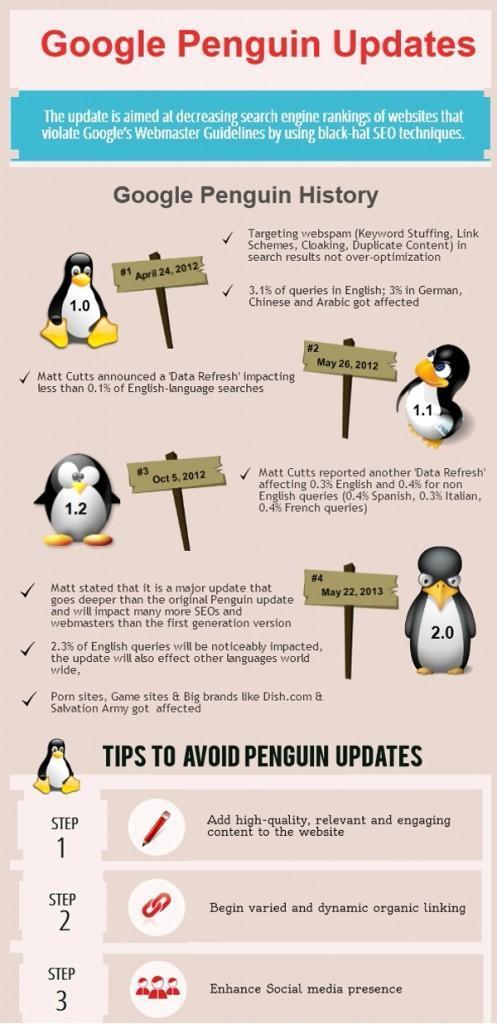Attack of the Penguin (3.0)
By:
Kim Clark
on 1/20/2015
That cute flightless bird that SEO agencies and website owners dread hearing returns as Penguin 3.0. Sometimes, I wonder if Google didn’t choose to name their changes after cute creatures to try and disguise the carnage that follows after each new creature lands. It kind of reminds me of that vicious rabbit in the Monty Python skit. By now every time someone who works with websites hears the word penguin, they no longer think of the cute animals, instead it brings a deep sigh and thoughts of what fixes will have to be made to recover lost traffic.

Fortunately, it has been more than a year since the last Penguin update was unleashed, and so far, the 2014 version of Penguin seems pretty tame compared to its predecessors.
Past Penguin Updates
Penguin 3.0 is one of many updates that Google has made to its algorithm since 2012. Most of the Penguin updates are targeted at websites still using old, “black-hat” SEO strategies. Penguin’s goal: give higher rankings to sites that are most relevant to search queries without relying on keyword stuffing or links from questionably relevant sites. (This is why its important to check the back-links, folks. Spammy links are not your friend.)
This adorable and easy to understand image from Viral SEO Services gives a good idea of the scope of previous Penguin updates and how they impacted the web. Penguin 2.1 from October 2013 is missing from the graphic, but it did not have a big impact on sites and was more than likely just a data update.

Penguin 3.0
Penguin 3.0 was highly anticipated, but most site managers didn’t notice as much impact as they did when Penguin 2.0 landed. I like to think this is because website owners and SEO agencies have already made the changes to their site content that Google wanted to see so they could recover the traffic they may have lost from previous Penguin updates.
In a nutshell, here’s what changed:
- If you have links to or from poor sources, your site no longer gets credit for having that link.
- Sites with newly discovered spam signals were demoted in regards to search query ranking.
- Sites that cleaned up their spam signals since the last Penguin (Penguin 2.1) were rewarded for their efforts with better rankings.
Again, not a huge change, but change enough that it could affect your traffic negatively if your content strategy continues to utilize bad SEO habits. On the other hand, if you learned your lesson last year and have been putting forth an honest effort with your strategy: your site is creating valuable pages and building solid links; you may have seen a jump in rankings. Good for you.
Other Past Google Algorithm Changes | Penguin, Panda, Phantom, Hummingbird, and Pirates
Whatever they choose to name it, every time Google decides to make a change to the way they rank the importance and relevance of a site for a search query it has an effect on your SEO Strategy. One of my favorite sites moz.com, has been keeping track and they say that Google actually makes around 500-600 changes every year. That means we only hear about and take notice of less than 5% of these changes.

For your convenience, Moz.com has charted every major algorithm change that Google has made over the course of the last 14 years and has organized it into a great timeline that makes it easy to see the progression of the changes. I really do love them so.
This timeline also makes it easy to look up changes by date. Want to get really fancy? Go to your analytics profile and make an annotation for each of these updates and then sort the data by the largest range of time you can to see if your site had traffic impacts from specific updates. If you know what you have been hit with, you know what you need to fix, and knowing is half the battle my friends. Or something like that.
Related Posts
AI and SEO: New Rules for Success
By:Jason Clark on 3/19/2025
AI has transformed traditional SEO strategies by enhancing content creation capabilities, analyzing detailed website data, and identifying trends that can inform strategic decisions.
Read More »Finding the Right Mix for Your Marketing: SEO vs Paid Search
By:Jason Clark on 3/28/2025
Aside from your email list (you DO have an email list, right?), search engines consistently drive some of the most valuable traffic for business websites. Users who actively seek your products or services through search engines are often ready to convert, making this traffic particularly valuable. At VIA Studio, we recommend a balanced approach: leveraging both Search Engine Optimization (SEO) and Paid Search (PPC) tactics. SEO offers sustainable, long-term growth, while Paid Search can deliver immediate results.
Read More »